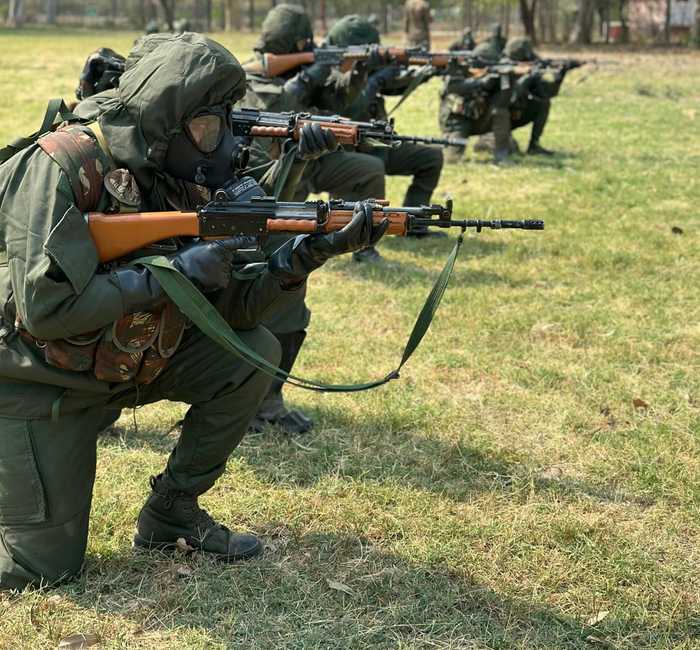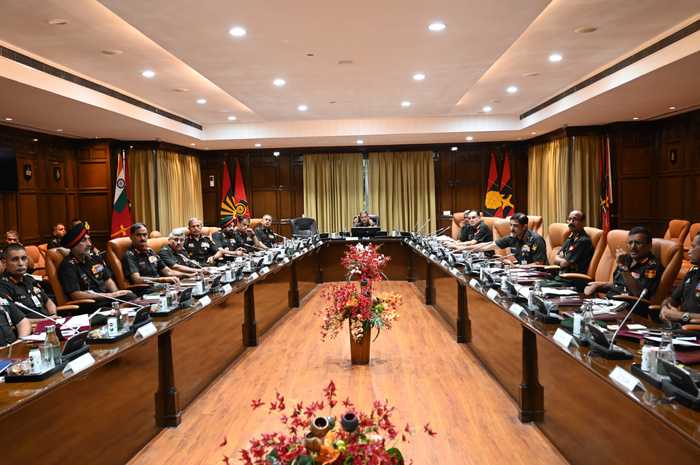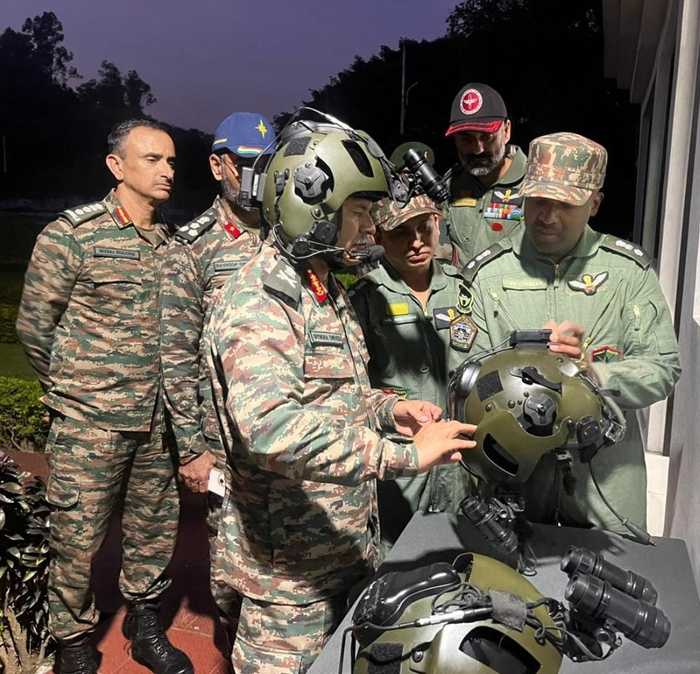Published 17:48 IST, August 20th 2024
Indian Army Charts Strategic Vision for 2047 Under New COAS General Upendra Dwivedi
On August 19-20, 2024, the Indian Army's senior leadership gathered in New Delhi under General Upendra Dwivedi for a pivotal strategic dialogue.
- Defence
- 5 min read
New Delhi, India: In a landmark gathering, the senior leadership of the Indian Army convened in New Delhi on August 19, 2024, for a crucial two-day strategic dialogue chaired by General Upendra Dwivedi, the recently appointed Chief of the Army Staff (COAS). This high-level meeting, the first under General Dwivedi’s command since he assumed office on June 30, 2024, brought together the General Officer Commanding-in-Chiefs (GOC-in-Cs) of the Indian Army’s seven commands to deliberate on the Army's future trajectory during India’s Amrit Kaal.
The discussions, which will continue through August 20, focused on aligning the Army’s strategic initiatives with the Government of India’s ambitious Vision 2047—a blueprint aimed at transforming India into a developed nation, a significant global player, and one of the most desirable countries to live in by 2047.
The session was a critical opportunity for the Army's top brass to engage in comprehensive discussions on how the Indian Army can contribute to this national vision. The Army’s leadership articulated its Vision@2047, underscoring a commitment to evolve into a modern, agile, adaptive, technology-enabled, and self-reliant force. This transformation aims to prepare the Indian Army to effectively deter and win wars in a multi-domain environment, ensuring the protection of national interests in close coordination with other services.
Defining Goals for the Decade of Transformation
The Indian Army’s march into a decade of transformation was initiated with the declaration of 2023 as the ‘Year of Transformation’ and 2024 as the ‘Year of Technology Absorption.’ These initiatives are designed to unify the Army's rank and file towards the ambitious goals set for the coming decade.

The senior leadership outlined several key objectives that will guide the Army's evolution over the next ten years, including:
- Theaterisation and Reorganisation: The Army plans to undertake a comprehensive reorganisation of its headquarters, commands, and other key formations. This reorganisation includes realigning the boundaries of Command, Corps, and Area Headquarters to enhance operational efficiency and readiness.
- Infrastructure Development: A significant focus was placed on developing world-class infrastructure to bolster the Army's operational capabilities across land, air, cyber, and space domains.
- Data-Centric Operations: The discussions emphasized the importance of leveraging advanced technology to conduct data-centric operations, thereby enhancing the Army’s existing capabilities and improving decision-making processes.
- Capability Development: A detailed roadmap for upgrading mechanised forces, artillery, combat aviation, air defence, and infantry units was discussed. This includes plans to enhance logistics and ammunition infrastructure, and to establish new structures that support multi-domain operations.
- Indigenisation and Self-Reliance: General Dwivedi stressed the importance of promoting self-reliance within the Army by indigenizing equipment, platforms, and weapons. The Army’s leadership reaffirmed its commitment to supporting Indian defence industries in developing world-class military hardware and facilitating India’s emergence as a leading defence exporter.
Strategic Discussions and Initiatives

The meeting also highlighted several other strategic initiatives that are essential for the Army's future readiness:
- Joint Operations and Integration: Enhancing joint operations and integration between the Army, Navy, and Air Force was identified as a crucial step in meeting the future challenges of warfare. The leadership emphasized the need for greater synergy among the services to ensure a unified and effective response to any threat.
- Indigenisation Efforts: The Army's ongoing efforts to support the domestic defence industry were recognized as a key pillar of India’s strategic autonomy. The leadership committed to furthering these efforts, aiming to position India as a global leader in defence exports.
- Human Resource Development: The Army's leadership also focused on initiatives aimed at improving the quality and effectiveness of personnel across all ranks. Recognizing the importance of a well-trained and motivated workforce, the discussions included strategies for enhancing training programs and career development opportunities.
Additional Initiatives

The discussions concluded with a review of ongoing initiatives aligned with the National Vision, including:
- Military Education and Training: The Indian Army’s leadership in military education was underscored, with particular recognition given to the Centre for United Nations Peacekeeping (CUNPK) as a Center of Excellence.
- Defence Diplomacy: The expansion of India’s Defence Wings, the Indian Army’s growing role in United Nations missions, and increased participation in joint exercises with foreign countries were highlighted as vital components of India’s defence diplomacy.
- Whole of Nation Approach: The Army’s involvement in national initiatives like Gati Shakti was discussed, with significant progress reported in identifying and developing dual-use infrastructure to support both civilian and military needs.
- Healthcare and Education: The Army's contributions to national healthcare through the ECHS and military hospitals, as well as its role in education and skill development through initiatives like the Kaushalveer scheme, were commended.
- Youth Empowerment and Sports: The Army’s efforts in empowering the youth through the National Cadet Corps (NCC) and promoting sports through the Mission Olympic initiative were also discussed as key elements of the Army's broader societal engagement.
The two-day meeting in New Delhi reaffirmed the Indian Army's commitment to evolving into a future-ready force, capable of not only safeguarding national interests but also contributing significantly to the vision of Viksit Bharat@2047. Under the leadership of General Upendra Dwivedi, the Indian Army is poised to navigate the challenges of the future with a focus on modernization, self-reliance, and jointness, ensuring that it remains a formidable and adaptive force in the years to come.
Updated 17:48 IST, August 20th 2024